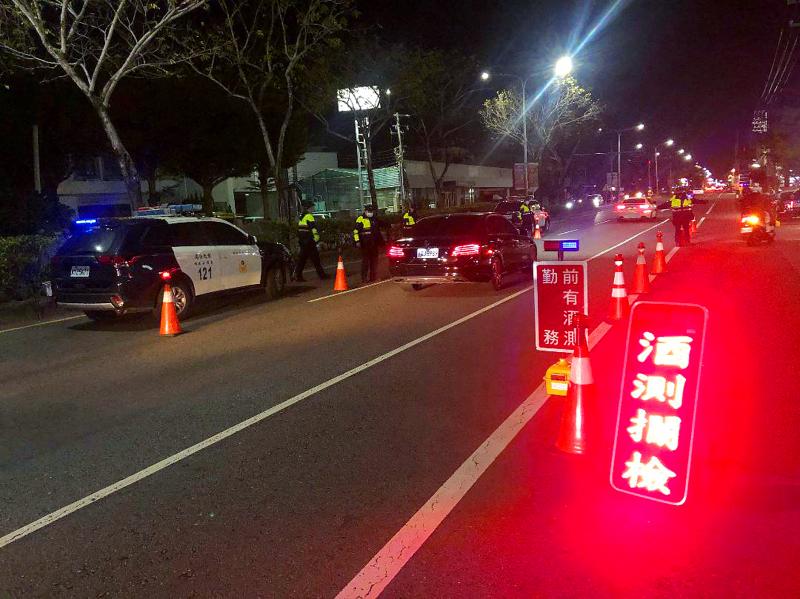The government is to implement stricter criteria to determine whether a person serving a prison sentence after a drunk-driving incident can be released on parole and whether penalties in such cases can be commuted to a fine, the Executive Yuan said yesterday.
The rise in casualties of drunk-driving incidents came under scrutiny after a man surnamed Huang (黃), 38, allegedly struck a family of four as they were crossing a street on Dec. 26 last year, killing the mother. His blood alcohol level reportedly exceeded the legal blood alcohol limit fivefold.
Following the accident, the Ministry of Transportation and Communications proposed an amendment to the Road Traffic Management and Penalty Act (道路交通管理處罰條例), which would authorize police to confiscate a drunk driver’s vehicle even if they are first-time offenders.

Photo courtesy of the Changhua County Police Department
Those who are found to drive drunk up to 10 years after their first such offense would be registered as repeat offenders, up from five years, and passengers of drunk drivers would also face fines, the draft amendment stipulates.
Separately, the Ministry of Justice said it would set stricter standards to review petitions from drunk drivers to be released on parole or pay a fine. Executive Yuan spokesman Lo Ping-cheng (羅秉成) told a news conference yesterday that drunk drivers who are on probation can be ordered to undergo medical treatment for alcohol abuse.
“In the past, drunk drivers could choose to pay a fine if their reckless behavior led to no or light injuries,” he said. “This is not an effective way to curb drunk driving. It has also given drunk drivers a sense of false security that they can avoid prison sentences by paying a fine.”
Article 41 of the Criminal Code stipulates that prison terms of no more than six months can be commuted to a fine, but the provision does not apply to the cases “in which the commutation of the punishment is manifestly of little corrective effect or the legal order cannot be maintained,” Lo said.
“The law enables prosecutors to strictly review petitions for parole or commutation of penalties. Amending the Criminal Code will not be necessary,” he said.
However, the Ministry of Justice is to define stricter criteria for prosecutors to review parole or commutation petitions before the end of March, Lo said.
Also yesterday, the legislature’s Judiciary and Organic Laws and Statutes Committee reviewed proposed amendments to the Criminal Code to toughen penalties for drunk drivers.
Democratic Progressive Party Legislator Chiang Yung-chang (江永昌) said the amendments should not only impose heavier fines on drivers, but also hold third parties involved in an offense liable.
The fundamental solution to curb drunk driving is collective supervision by society, he said.
“At year-end banquets, employers often urge employees to drink, but they do not hire a taxi or designate drivers to take other employees home. They let employees drive or ride scooters while intoxicated,” Chiang told the committee meeting. “The Criminal Code holds employees accountable for drunk driving, but what about their supervisors? Should bars and restaurants not be responsible for letting intoxicated customers drive and ride motorcycles?”
Deputy Minister of Justice Chen Ming-tan (陳明堂) said the ministry would evaluate Chiang’s proposal.
Additional reporting by Hsieh Chun-lin

The Ministry of Economic Affairs has fined Taobao NT$1.2 million (US$36,912) for advertisements that exceed its approved business scope, requiring the Chinese e-commerce platform to make corrections in the first half of this year or its license may be revoked. Lawmakers have called for stricter enforcement of Chinese e-commerce platforms and measures to prevent China from laundering its goods through Taiwan in response to US President Donald Trump’s heavy tariffs on China. The Legislative Yuan’s Finance Committee met today to discuss policies to prevent China from dumping goods in Taiwan, inviting government agencies to report. Democratic Progressive Party Legislator Kuo Kuo-wen (郭國文) said

The Ministry of Economic Affairs has fined Taobao NT$1.2 million (US$36,900) for advertisements that exceeded its approved business scope and ordered the Chinese e-commerce platform to make corrections in the first half of this year or its license would be revoked. Lawmakers have called for stricter supervision of Chinese e-commerce platforms and more stringent measures to prevent China from laundering its goods through Taiwan as US President Donald Trump’s administration cracks down on origin laundering. The legislature’s Finance Committee yesterday met to discuss policies to prevent China from dumping goods in Taiwan, inviting government agencies to report on the matter. Democratic Progressive Party

Taiwan and its Pacific ally Tuvalu on Tuesday signed two accords aimed at facilitating bilateral cooperation on labor affairs, according to Taiwan’s Ministry of Foreign Affairs (MOFA). The governments inked two agreements in Taipei, witnessed by Foreign Minister Lin Chia-lung (林佳龍) and visiting Deputy Tuvaluan Prime Minister Panapasi Nelesone, MOFA said in a news release. According to MOFA, the agreements will facilitate cooperation on labor issues and allow the two sides to mutually recognize seafarers’ certificates and related training. Taiwan would also continue to collaborate with Tuvalu across various fields to promote economic prosperity as well as the well-being of their

Sung Chien-liang (宋建樑), who led efforts to recall Democratic Progressive Party (DPP) Legislator Lee Kun-cheng (李坤城), was released on bail of NT$80,000 today amid outcry over his decision to wear a Nazi armband to questioning the night before. Sung arrived at the New Taipei District Prosecutors’ Office for questioning in a recall petition forgery case last night wearing a red armband bearing a swastika, carrying a copy of Adolf Hitler’s Mein Kampf and giving a Nazi salute. Sung left the building at 1:15am without the armband and covering the book with his coat. Lee said today that this is a serious